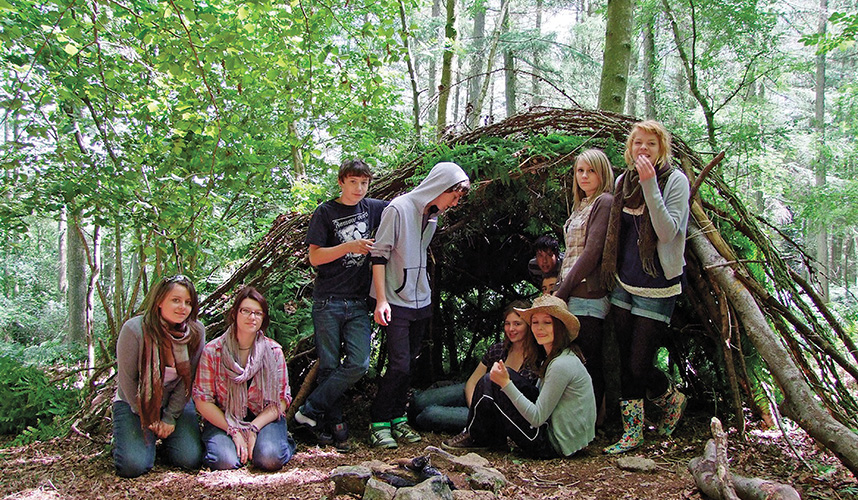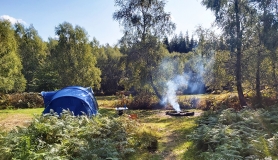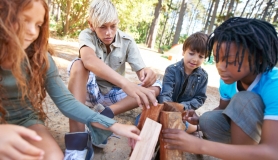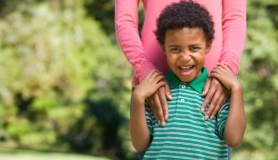What goes on when a pre-teen reaches puberty? With hormones racing through them, their bodies start to change shape and size and they are much more interested in what their peers think and the opposite sex. Hormones begin to change their moods too, and puberty can be a rollercoaster ride of emotions.
Older societies have understood that this is a key transition time, one of several “rites of passage” that a human passes through such as birth, marriage, becoming a parent, and death. It is a rite that effectively leaves the old behind and makes space for the new. From 13 – 19 years of age (if the transition occurs), teenagers become “in betweeners”, neither child nor adult, a metamorphosis that ends with an adult emerging. In an ideal world, an adult who wants to serve something greater than him or herself and who is valuable to society, full of adventure and vitality.
A psychological separation
The journey towards adulthood, broadly speaking, includes a psychological separation from the family of origin, coming to terms with childhood fears, learning new coping skills, dying psychologically to the childhood identity, and the re-emergence of a new outer and inner identity. The outer identity includes finding a greater competence and sense of self; freed from old family patterns, and supported by the wider community, to become an adult in service to a community they feel a part of.
The value of mentors
The teenage years are perfect for bringing in the support of aunties and uncles, grandparents, and good friends who care about your child. Because teenagers are increasingly engaging with the world outside the home, these chosen mentors often have a much better chance of positively influencing them, instilling healthy values, and mentoring them than you as a parent have!
This is where a residential experience can come into play, away from their immediate family. Even better if it’s an outdoor, wilderness-based experience with challenges that push a teenager to their edge; enabling them to see themselves in a different light, to learn, to have hope for their future, and to be supported by people who have lived a little and still love life.
Traditional rituals
In their book Betwixt and Between, Stephen Foster and Meredith Little describe how around the world, earth-based cultures with unbroken linkages understood that a community-based ritual was necessary to mark the transition from a young person to an adult. Once a challenge was completed away from their community, the young person was seen to be an adult, marked by a community honouring and celebration. A boy facing manhood from the Cheyenne Nation would have studied and prepared to pass the test – to live alone for four days and nights without water or food on a sacred mountain. A respected older man or “uncle” helped him prepare. When he returned he would no longer live at home.
A girl facing womanhood from the Washoe Nation would have been prepared for the onset of her first period from childhood. At the first sign of her period, she withdrew from the village with a medicine grandmother. For four days and three nights, she remained in a dark lodge, a symbol of grandmother earth, without eating. Late on the fourth day, the medicine grandmother fetched her from the lodge and she was told to run to the top of a mountain carrying a basketful of coals. There, she found four piles of kindling. With the coals, she lit the four fires, praying for strength and guidance. She then ran back down the mountain and was received by the village who welcomed her as a woman, celebrating with an all night women’s dance.
Away from the home
In the western world we have very few examples of this kind of community support, though celebrations such as Bar Mitzvah or Confirmation are available as transition markers for religious families. It is less easy for us to recreate the “village” experience where the teenager is surrounded by people that care for him or her, and want to support his or her growth. But we can offer experiences that support teenagers to build their resilience and self-esteem away from the family home. If you do your job well, teenagers should want to get away from you!
There are many camping residentials that provide young people with opportunities to spend time away from the home, learn new things, and spend good times with their friends and peers – all valuable tools for growth. There are also camp-based experiences run by experienced facilitators, with programmes that emphasise more overtly the phase of life these young people are in, and set activities or group time which addresses issues coming up for them. These camps can provide experiences to challenge teenagers, such as a solo night (spending a night alone on the land), going into a sweat lodge, being witnessed by the group, and taking risks to show up and be seen. Camps like this are led by adults who know the value of these young people to our future, and want to see them succeed – but also know that becoming an adult means giving up a part of yourself in return for a valued place in society. If the process of transition is successful, then the adult no longer thinks just about himself or herself, but has built enough skills of introspection to develop individual yet healthy attitudes and values concerning themselves and others. Fundamentally, these new adults will have a sense of belonging and being part of something, and feel welcomed by their society. This can also include belonging to the non-human world – the intricate web of diverse life on the planet – as any adult understands that our future is intertwined with that of the planet.
More than just me
Growing up brings a perspective that is wider than the one of the toddler and teenager – it is not just about yourself – and how many of us with children or teenagers know how self-centred their world can be! A residential, whilst being fun, removes the young person out of their comfort zone and into a community of peers and aunties and uncles. It provides teenagers with a melting pot, often around a fire, of new ideas and perspectives, of time to listen to their own voice and others’, to go through fears and see they were only paper tigers, and to gain a sense of achievement beyond their imaginings. I have seen young people really relax too; experiencing a quietness of mind new to them, getting away from the speed of their teenage lives – their schools, parties, dressing up to look good and in fashion. There is nothing like sitting around a fire that you have made and cooked on!
Role models
A rite of passage for teenagers is a community experience, and essentially is in service to the community. Ideally, the preparation involved includes significant people in their lives. Our teenagers really need to know that they are valuable members of society, but they need to earn their right to enter adulthood. Earth-based societies have a hierarchy, where adults and elders are respected because they have the interests of their community at heart, and are attractive as role models to the younger generation. Teenagers need adults to be worthy role models. A good camp has adults across the generations, who have a sense of fun, can be honest, challenge where necessary and have a sparkle. They need to be experienced and skilled facilitators to provide a strong container for the rising sap of teenagers, to pull them through to new territories that will make a lasting impact in their lives.
Marina is a parent and workshop facilitator at Circle of Life Rediscovery and Life Skills Education. She encourages young people to find their real voice and discover pathways to true adulthood.







